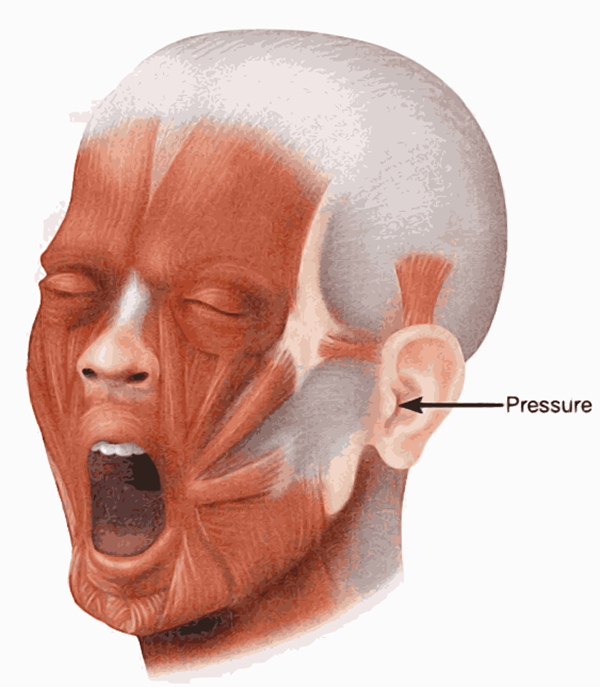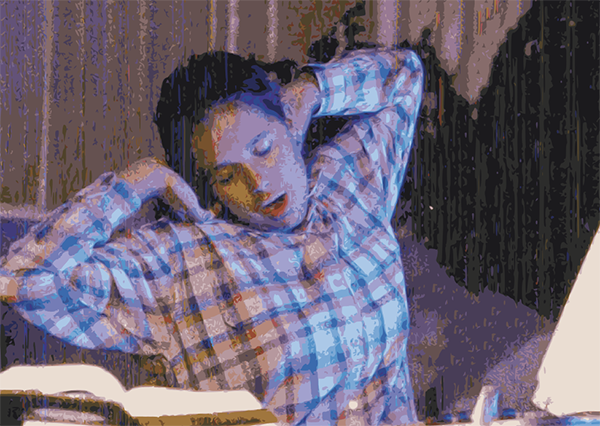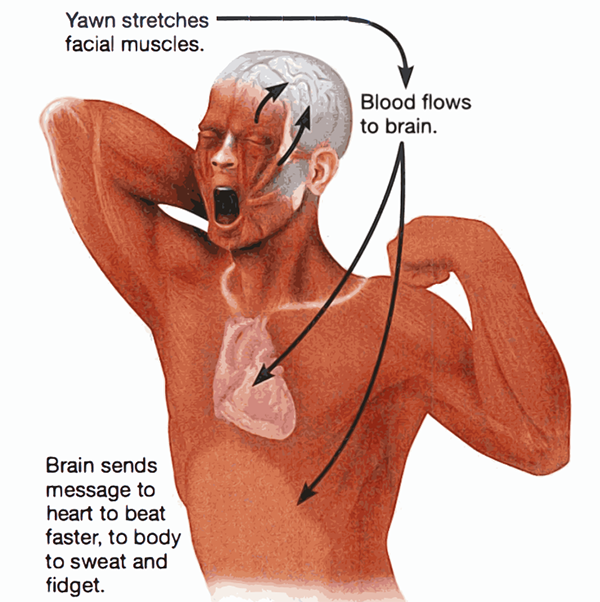Yawning
1 This article is going to cast a spell on you. As you read it, pressure will build behind your ear drums, and you'll lift your eyebrows and open your mouth wide. You'll hold this position for about six seconds as you take in a deep breath and then let a short one out.
2 Don't panic. It's just a contagious yawn. When you read about yawning, see someone yawning, or just think about yawning, you usually yawn yourself. But what's the purpose of yawning? Most people think that the answer is simple. You yawn when you're bored or sleepy. Some people think you yawn because you need extra oxygen. Is it true?

3 Robert Provine, a scientist at the University of Maryland-Baltimore County, set out to find out. The first thing he did was to test whether people yawn when they're bored. Provine had no problem boring an unlucky group of people by making them watch a video of color-bar patterns. A different, lucky group got to watch a music video. No need to say that the people in the first group won the yawning contest.
4 To see if people yawn more when they're sleepy, Provine had his students keep a yawn diary for a week. Whenever they yawned, they had to write down the time. As you might guess, they yawned at night when they were tired and sleepy. But Provine also found that they yawned when they woke up in the morning.
5 When he thought about it, he realized that when people stretch, there's a good chance they'll also yawn. In fact, other scientists have also noticed that yawning and stretching are linked. For example, the muscles of people paralyzed on one side of their body jerk as they yawn, even though they can't make the muscles move on purpose.

6 People also yawn when they can't possibly be bored or sleepy. Sky divers yawn just as they're about to jump out of an airplane. Concert violinists yawn just before going on stage. Olympic athletes yawn just before a big competition. Provine thinks these people may be yawning because they're nervous. He thinks that when you're nervous, sleepy, bored, or have just awakened, yawning can help focus your attention.
7 Ronald Baenninger, a scientist at Temple University, agrees with Provine. He and his wife Mary Anne, a scientist at The College of New Jersey, guessed that yawning helps you stay awake or become excited. They tested their guess by hooking up people to machines that measured changes in their bodies as they yawned. They found that as people yawned, they moved their wrists more than usual, they began sweating, and their hearts beat faster. This shows that these people were trying to stay awake, not fall asleep.

8 So what does yawning do that helps keep you alert? Provine thinks that by yawning, you stretch the muscles in your face muscles and bring more blood to the brain. "It stirs things up," he says. The brain can then wake up the body through the fidgeting, sweating, and the faster heartbeat. You can see how this might help you stay awake at night, wake up in the morning, or become alert when you're bored or nervous.
9 Provine also tested whether people yawn to breathe in more oxygen. He had people breathe in a special mix of air that had less oxygen than usual. To get the oxygen they needed, people had to breathe faster. 'We had people huffing and puffing," he says. "But they didn't yawn any more than they did before."
10 He didn't stop there. He also made people breathe in air that was all oxygen. They had more than enough oxygen in their blood, but they yawned just as much as before. So the idea that we yawn to get more oxygen can't be right.
11 But not everyone agrees with Provine and the Baenningers. Some scientists think that yawning has no purpose. They say that it's a habit left over from when you were developing as a baby in your mother's womb or one you inherited from our animal ancestors. Yawning might help get the face muscles and jaw muscles of unborn babies working, and it might help animals stay alert.
12 It's amazing how difficult it is get to the bottom of something as simple as a yawn.
alert | adjective /əˈlɜrt/ منتبه
Paying attention to something.
Similar words: attentive, watchful, vigilant, observant
amazing | adjective /əˈmeɪzɪŋ/ مدهش
Surprising in a way that causes wonder or astonishment.
Similar words: astonishing, astounding, incredible, remarkable
ancestors | noun /ˈænsɛstərz/ الأجداد
People or animals from the past that you are related to.
Similar words: forebears, predecessors, forefathers, progenitors
blood | noun /blʌd/ الدم
The red liquid pumped by the heart through the body.
Similar words: lifeblood, hemoglobin, fluid, plasma
brain | noun /breɪn/ الدماغ
The part of the body used for thinking and feeling.
Similar words: mind, cerebrum, intellect, gray matter
cast a spell | verb phrase /kæst ə spɛl/ يلقي تعويذة
Cause a special effect, often magical.
Similar words: enchant, conjure, bewitch, charm
competition | noun /ˌkɑmpəˈtɪʃən/ منافسة
An event in which people try to do something better than others.
Similar words: contest, rivalry, race, tournament
contagious | adjective /kənˈteɪdʒəs/ معدٍ
Able to be given to others, often referring to diseases or behaviors.
Similar words: infectious, communicable, transmittable, spreadable
developing | verb /dɪˈvɛləpɪŋ/ في طور النمو
Growing or expanding over time.
Similar words: evolving, maturing, advancing, progressing
diary | noun /ˈdaɪəri/ مذكرات
A book where people describe what happened to them each day.
Similar words: journal, log, record, notebook
ear drums | noun phrase /ɪər drʌmz/ طبلة الأذن
Parts inside the ear that move so you can hear sound.
Similar words: tympanum, eardrums, auditory membrane, tympanic membrane
extra | adjective /ˈɛkstrə/ إضافي
More than usual or needed.
Similar words: additional, surplus, extra, spare
fidgeting | verb /ˈfɪʤɪtɪŋ/ التململ
Moving the body in a nervous or restless way.
Similar words: twitching, shuffling, squirming, jittering
get to the bottom of | verb phrase /gɛt tə ðə ˈbɑtəm əv/ يصل إلى حقيقة
Learn the truth about something.
Similar words: uncover, resolve, discover, solve
habit | noun /ˈhæbɪt/ عادة
Something that you do over and over.
Similar words: routine, practice, custom, tendency
huffing and puffing | verb phrase /hʌfɪŋ ənd pʌfɪŋ/ اللهث
Breathing quickly and a lot, often from exertion or stress.
Similar words: panting, gasping, wheezing, breathing heavily
inherited | verb /ɪnˈhɛrɪtɪd/ موروث
Received from ancestors or parents.
Similar words: passed down, acquired, received, bequeathed
jerk | verb /ʤɜrk/ حركة مفاجئة
Move suddenly and quickly.
Similar words: twitch, snap, yank, jolt
linked | verb /lɪŋkt/ مرتبط
Connected or related to something else.
Similar words: associated, connected, joined, related
measured | verb /ˈmɛʒərd/ قاس
Figured out how much of something there is.
Similar words: calculated, determined, quantified, evaluated
on purpose | adverb /ɒn ˈpɜrpəs/ عن قصد
Meaning to do something intentionally.
Similar words: deliberately, intentionally, knowingly, purposely
panic | verb /ˈpænɪk/ ذعر
Get very scared and act irrationally.
Similar words: fear, alarm, distress, fright
paralyzed | adjective /ˈpɛrəlaɪzd/ مشلول
Not able to move your body.
Similar words: immobile, incapacitated, frozen, disabled
patterns | noun /ˈpætərnz/ أنماط
Designs of regular shapes and lines.
Similar words: designs, motifs, arrangements, configurations
position | noun /pəˈzɪʃən/ وضعية
Where something is located or placed.
Similar words: location, placement, spot, posture
pressure | noun /ˈprɛʃər/ ضغط
Force or tension applied to something.
Similar words: force, stress, strain, tension
purpose | noun /ˈpɜrpəs/ غرض
The reason for doing something.
Similar words: reason, intention, goal, objective
sky divers | noun phrase /skaɪ ˈdaɪvərz/ القافزون بالمظلات
People who jump out of airplanes as a sport.
Similar words: parachutists, jumpers, air divers
stretch | verb /strɛʧ/ تمدد
Make a body part longer by pushing it out.
Similar words: extend, elongate, lengthen, reach
violinists | noun /vaɪəˈlɪnɪsts/ عازفو الكمان
People who play the violin, a musical instrument.
Similar words: musicians, fiddlers, string players, instrumentalists
womb | noun /wuːm/ رحم
The part of a woman's body where a baby can grow.
Similar words: uterus, maternal cavity, gestational organ
wrists | noun /rɪsts/ المعاصم
The part of the body between the hand and forearm.
Similar words: joints, carpal, cuff, arm joint

